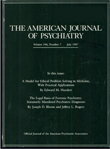Sustained change in parents receiving preventive interventions for families with depression
Abstract
OBJECTIVE: The purpose of this study was to compare the sustained effects of two cognitive, psychoeducational preventive interventions for families in which a parent had an affective disorder. METHOD: Thirty-seven families, in which there was a child between the ages of 8 and 15 years (mean = 11.5 years) and at least one parent who had experienced a recent episode of affective disorder according to the Research Diagnostic Criteria, were studied 1.5 years after enrollment in the study. The families were randomly assigned to one of two interventions, clinician-facilitated or lecture. The two interventions were similar in content but differed in the degree of involvement of the children and the linking of information to the families' life experiences. Nineteen families participated in the clinician- facilitated intervention, which consisted of six to 10 sessions. Eighteen families were assigned to the lecture condition, which consisted of two lectures attended only by parents. Family members were interviewed both before and after the interventions with diagnostic interviews and semistructured measures designed to assess response to the interventions. RESULTS: Sustained effects of the interventions were reported 1.5 years after enrollment. The clinician-facilitated intervention was associated with more positive self-reported and assessor-rated changes than the lecture intervention. CONCLUSIONS: These short-term preventive interventions, particularly the clinician- facilitated one, have long-term benefits for families with parental affective disorder.



